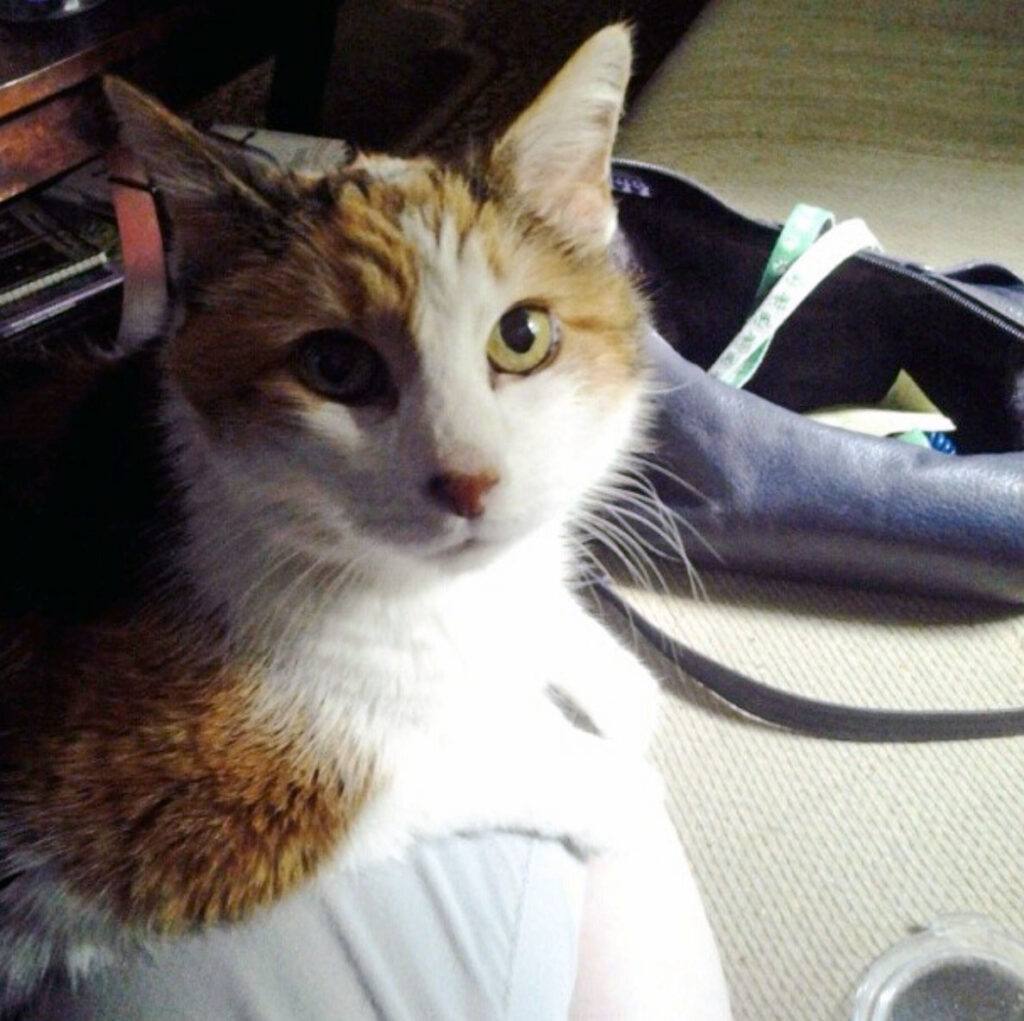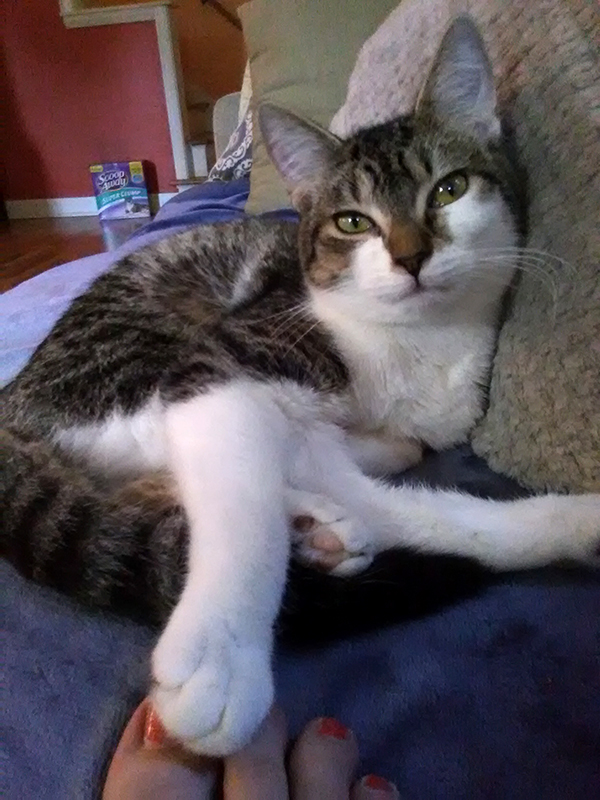This post may contain affiliate links. This means I may receive a small commission if products are purchased through them. All opinions are honest and remain my own.

Everyone knows a dog could never be left on his own for more than a few hours. Dogs need to be let outside to go to the bathroom multiple times a day. They need to be walked, fed, and of course, they love and need plenty of human interaction. But what about cats? Cats don’t ever need to be let outside. So how long is it acceptable to leave them alone? Is it OK to leave a cat alone for a weekend?
The technical answer is no, but it really depends. It is not recommended to leave an adult cat alone for more than 24 hours. And kittens should absolutely not be left alone for more than a few hours. BUT, in most cases, if your adult cat is in normal good health and doesn’t require any daily medications, it is probably going to be OK to leave her alone for two days. It’s not ideal. If possible, you should really get someone to check in on her at least once a day. And if you are going to be away for longer than 48 hours, a cat sitter is a must.
All measures should be taken to ensure that you don’t have to resort to this, but if you are really in a bind and can’t find anyone to cat sit, you will at least need to make sure that everything in your house is set up for kitty to have a safe weekend.
Going away for the weekend – Cat Checklist
1. Leave out plenty of dry food
In general, it’s a great idea to feed your cat healthy brands of wet food, but only when you are at home with her. Wet food can’t be left out for longer than 1-4 hours, so you will need to make sure your cat has enough dry food at her disposal for the entire time you are away. Normally cats like routine and a regular feeding schedule, but in your absence, you will have to leave out more than usual (another reason why having a cat sitter is a better idea than leaving kitty on her own.)
A great way to maintain a semblance of routine even while you’re away is by having an automatic food dispenser. These are great for cats that tend to eat up all the food in their bowl too quickly. Last year I purchased this WOPET one from Amazon as a gift for a fellow cat mom friend and it has held up really well.
In fact, she told me it’s the best present she has ever received! The feeder can be programmed to dispense controlled portions of your choosing and at your desired intervals. And the coolest part? You can even record a voice message to play for your cat at every feeding. How cute is that? It also has a battery feature in case the power goes out. My friend said the only thing she has noticed is that it doesn’t keep perfect time. It’s 13 minutes different now from when she first got it, but that it wasn’t a big deal.
*Keep in mind, however, that all devices could possibly malfunction, and power outages are always a possibility. Have backup food and water just in case.

2. Put out multiple bowls of fresh water
Even if you only have one cat, it’s advisable to have more than one water source. Cats like to have choices. They might prefer to drink in a certain spot of the house more than others. And if you’re going to be away, there should be plenty of extra water to ensure that they have enough.
Remember to also keep your cat’s water separate from their food. Cats in the wild prefer not to drink in the same area that they hunt for prey in case of any possible contaminants. This preference remains instinctive, even in house cats. It’s recommended to at least have the water on the other side of the room, or, even better, in another room.
Since cats also like fresh, moving water (which is why you often find them licking from faucets) a cat water fountain is a great idea. This would allow your cat to have a fresh water source even in your absence. This Veken one on Amazon has the best reviews.

3. Make sure the litter boxes are clean
Yes, litter boxes. You should have more than one, even if you only have one cat. The official formula is n+1, so for one cat you should have two litter boxes, for two cats you should have three litter boxes, and so on. Cats are fussy about their potties, so make sure the last thing you do before you leave the house is double-check that all the boxes and completely clean and full of fresh litter.

If money is no object, they even make automatic litter boxes that scoop themselves. They are pricy, though. I’ve never used one myself, but I found this hilarious video for one (this PetSafe ScoopFree Automatic Litter Box) if you are in need of a chuckle today:
4. Kitty-proof your house

Before leaving your fur baby home alone, you will definitely want to take the time to make sure you don’t come home to a tragedy. Things that you can do to make sure your house is safe for cats are:
- Remove any poisonous plants – There are many common plants that are toxic for cats. You will want to remove these from the cat’s living space entirely. Lilies are especially poisonous. Don’t ever let your cat anywhere near lilies. Check out this list of common poisonous plants for cats.
- Secure electrical outlets and cords – Electrical outlets can cause shocks to a cat if licked, so cover them with outlet protectors. Similarly, if a cat chews through an electrical cord it can cause burns and electrocution. Keep cords in a place that the cat can’t get to them or try covering them with cord protectors.
- Keep anything with a lid closed – This includes things like the toilet, the garbage can, and the washer and dryer.
- Put away any dangerous chemicals – Make sure all cleaning products and medications are safely put away where curious kitties can’t access them. If your cat is adept at getting inside cabinets, invest in childproof cabinet locks.
- Tie up blind cords and put away any plastic bags – Both blind cords and plastic bags with handles are enticing for cats to play with, but can easily become tangled and cause strangulation.
- Put away small things – It’s a good idea to keep little things like hair ties, rubber bands, and paper clips out of reach for cats. They may like to play with these things but they can be a choking hazard.
- Lock windows – Even in the summertime you will want to close and lock all of the windows and doors if you are going to be away from home. Cats can potentially fall from windows and balconies.
5. Think about the weather
Speaking of closing and locking windows even in summertime, you will also need to make sure that your house is an appropriate temperature for your cat while you are away. Leave central air on during hot periods. If you don’t have central air conditioning and there turns out to be a heatwave during your absence, it could turn into an uncomfortable and potentially dangerous situation for your cat.
6. Invest in a pet camera
A pet camera is a great way to check in on your cat when you’re not at home. And if you’ve made the decision to go away for two whole days without getting someone to check in on your cat, setting up a pet camera to keep tabs on her is a wise idea.
I like this YI Dome Camera because it has 360-degree coverage and night vision. It’s also inexpensive so you could even get more than one and set them up in multiple rooms. The camera connects to your phone and sends you activity alerts so you can always know what your kitty is up to.

Cats are social creatures who do not like change
While cats have a reputation for being aloof and not needing human companionship as much as dogs, people with cats know this isn’t really true. Human interaction is just as important for cats as it is for dogs. Cats just show it in a different way. It is absolutely possible for cats to get bored or depressed if they are left alone for too long, so think about this before deciding not to find a cat sitter during your weekend away. Do what is best for your individual cat.
Cats can also get very upset if their routine is disrupted. They respond well to regular feeding times and regular playtime with their humans. If there is any doubt in your mind that your cat will not be OK with you being gone for longer than 24 hours, find or hire someone to check in on them.
What about cat boarding facilities?
Cats are very territorial creatures. I do not recommend taking them away from their home unless you have no other option. The experience of being transported to a strange place with strange cats would be traumatic and terrifying for a cat.
Remember..
- It is not advisable to leave an adult cat alone for more than 24 hours
- Kittens should never be left alone for more than a few hours
- Elderly and sick cats that need daily medication should never be left alone overnight
- If you do leave a cat alone for an entire weekend, be sure to follow the checklist
- Cat boarding facilities are not recommended

Leave a Reply